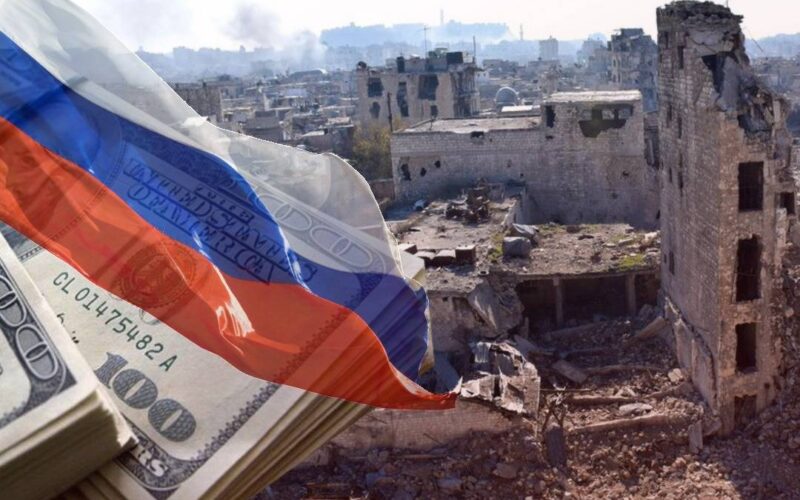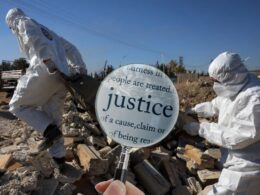Since 2015, Russia’s military intervention in Syria was crucial in prolonging the rule of the regime of Bashar Assad. While Moscow’s actions aimed to secure its geopolitical interests, they also wrought devastation upon the Syrian people and their homeland.
The immense scale of civilian casualties, destruction of critical infrastructure, especially hospitals, and widespread violations of international law demand a reckoning.
Given the collapse of the Assad regime, Russia must make reparations to Syria to rectify the damage resulting from its military intervention and crimes committed.
Rebuilding Syria
After Assad’s downfall, the reconstruction of Syria has begun, but it will take a significant amount of time due to the 13-year civil war. As an example, brick by brick, Idlib residents rebuild after the latest devastating Assad’s army strikes in an attempt to halt the Syrian rebels offensive.
After enduring devastating airstrikes, residents of this northwestern city are slowly rebuilding their homes, determined to restore normalcy despite the devastation left by the Syrian regime’s offensive.
Earlier this month, Assad’s and Russian troops launched the attacks, which destroyed homes and ignited fires in cars and schools, according to EFE. During that time, airstrikes and artillery attacks by Syrian and Russian forces targeted both military positions and civilians.
Russian military intervention into Syria to support bloody Assad’s dictatorship caused much damage and destruction and killed thousands of innocent Syrians. It also pushed tens of thousands to leave Syria and go to Europe to seek a safe asylum.
So, what are the key numbers of destruction in Syria caused by Russia and why it Moscow must pay reparations to Damascus?
Violations of International Law
Russia’s military operations in Syria raised questions about violations of international law. The indiscriminate use of cluster munitions, thermobaric weapons, and attacks on protected sites like hospitals and schools constitute potential war crimes.
The United Nations and other international bodies have repeatedly condemned these actions, but accountability has been elusive. Numerous organizations and political leaders accused Russia of war crimes in Syria.
Reparations would serve as both a form of accountability and a deterrent against future violations. The international community can send a clear message that it will not tolerate such actions by holding Russia financially responsible.
The Precedent for Reparations
The concept of war reparations is well-established in international relations. Historical precedents, like Germany’s reparations following World War II, underscore the significance of compensating affected nations for the damage they inflicted.
Reparations not only provide financial relief but also help to restore the moral fabric of post-conflict societies.
In Syria’s case, reparations from Russia would represent a critical step toward justice and reconciliation. They would acknowledge the suffering endured by the Syrian people and provide the resources necessary for rebuilding their cities.
Destruction of Infrastructure
Russia’s military campaign has targeted critical infrastructure, further exacerbating Syria’s humanitarian crisis. The Russian military campaign has systematically destroyed hospitals, water treatment facilities, power plants, and other essential services.
For example, reports have documented repeated airstrikes on hospitals, leaving millions without access to medical care in their time of greatest need.
The obliteration of Syria’s infrastructure has had ripple effects, undermining economic activity and leaving the population dependent on international aid. Reparations should prioritize restoring essential services to enable Syrians to rebuild their lives and regain self-sufficiency.
The Human Toll: Civilian Deaths and Displacement
Indiscriminate bombings and deliberate targeting of civilian areas have marked Russia’s military operations in Syria. According to reports by human rights organizations, Russian airstrikes have resulted in tens of thousands of civilian deaths. The strikes have reduced residential neighborhoods, markets, and schools to rubble.
The relentless bombardment has not only resulted in fatalities but also forced millions of Syrians to flee their homes. It will take generations for the psychological trauma of losing loved ones and uprooting from their communities to heal. Reparations must be allocated not only for rebuilding homes but also for addressing the immense human suffering inflicted.
Reports by international humanitarian organizations
The Syrian Network for Human Rights (SNHR) and Violations Documentation Centre (VDC) stated that from its inception in September 2015 until the end of February 2016, Russian airstrikes killed at least 2,000 civilians. The SNHR report stated that civilian deaths from the Russian offensive have exceeded those caused by the Islamic State and the Syrian Army since Russian operations began, according to confirmed data.
The UK-based pro-opposition Syrian Observatory for Human Rights (SOHR) issued a slightly lower estimate: at least 1,700 civilians, including more than 200 children. By the end of April 2018, the SOHR documented that Russian bombings directly killed more than 7,700 civilians, about a quarter of them children.
The Russian campaign has been criticized by numerous international bodies for indiscriminate aerial bombings across Syria that target schools and civilian infrastructure and the carpet bombing of cities like Aleppo.
A 2020 UN investigation report and the findings of BMJ Global Health both showed that the Russian army “weaponized health care” by bombing hospitals, ambulances, clinics, and all medical infrastructure as part of its hospital bombardment campaigns. Russia also reportedly employed double-tap strikes to target relief workers.
Human Rights Watch and Amnesty International stated that Russia is committing war crimes and deliberately targeting civilians.
In November 2024, the renewal of Russian airstrikes failed to halt the Syrian opposition offensives. Russia began to withdraw their forces, and the fall of the Assad regime followed in December. Russian forces in Syria at that time consisted of special forces, base security and an aviation unit.
Moscow tried to negotiate with new Syrian authorities after Assad’s downfall to keep its military bases in Syria, but apparently failed to convince or buy those whom it bombarded for years.
The Geopolitical Dimension
Critics might argue that demanding reparations from Russia is unrealistic, given its global influence and reluctance to admit wrongdoing. However, the international community has mechanisms to exert pressure. Sanctions, legal proceedings, and diplomatic isolation can all be leveraged to compel Russia to pay reparations.
In addition, Russia is now weak, under multiple international sanctions introduced for its war of aggression against Ukraine. And Putin’s regime is stuck in the Ukrainian front where it’s suffering heavy losses.
Moreover, supporting reparations for Syria aligns with the broader goals of promoting stability and peace in the region. A post-Assad Syria that receives adequate compensation for rebuilding will be less vulnerable to extremism and geopolitical exploitation.
A Path to Justice and Rebuilding
Russia’s intervention in Syria has left a lasting legacy of destruction and suffering. As the country looks toward a bright future without Assad, reparations from Russia are essential for addressing the harm caused, rebuilding the nation, and achieving justice for the Syrian people.
By holding Russia accountable, the international community can take a decisive step toward upholding the principles of international law and human dignity.








